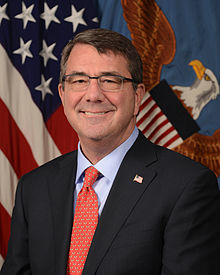Ash Carter
| Ash Carter | |
|---|---|
 |
|
| 25th United States Secretary of Defense | |
|
In office February 17, 2015 – January 19, 2017 |
|
| President | Barack Obama |
| Deputy | Robert Work |
| Preceded by | Chuck Hagel |
| Succeeded by | James Mattis |
| 30th United States Deputy Secretary of Defense | |
|
In office October 6, 2011 – December 3, 2013 |
|
| President | Barack Obama |
| Preceded by | William Lynn |
| Succeeded by | Christine Fox (Acting) |
| Undersecretary of Defense for Acquisition, Technology and Logistics | |
|
In office April 27, 2009 – October 5, 2011 |
|
| President | Barack Obama |
| Preceded by | John Young |
| Succeeded by | Frank Kendall |
| Assistant Secretary of Defense for Global Strategic Affairs | |
|
In office June 30, 1993 – September 14, 1996 |
|
| President | Bill Clinton |
| Preceded by | Stephen Hadley |
| Succeeded by | Jack Crouch (2001) |
| Personal details | |
| Born |
Ashton Baldwin Carter September 24, 1954 Philadelphia, Pennsylvania, U.S. |
| Political party | Democratic |
| Spouse(s) |
Clayton Spencer (divorced) Stephanie DeLeeuw |
| Relations | Cynthia DeFelice (sister) |
| Children | 2 |
| Education |
Yale University (BA) St John's College, Oxford (MS, PhD) |
Ashton Baldwin "Ash" Carter (born September 24, 1954) is a physicist and former Harvard University professor of Science and International Affairs who served as the 25th United States Secretary of Defense from February 2015 to January 2017. He was nominated by President Barack Obama, and confirmed in February 2015 by the Senate by a vote of 93–5, to replace Chuck Hagel as Secretary of Defense.
Carter received a B.A. in his double-major of Physics and Medieval History from Yale University, summa cum laude, in 1976. He then became a Rhodes Scholar and studied at the University of Oxford, from which he received his D.Phil. in theoretical physics in 1979. He worked on quantum chromodynamics, the quantum field theory that was then postulated to explain the behavior of nuclear reactions and the structure of subatomic particles. He was a postdoctoral fellow research associate in theoretical physics at Rockefeller University from 1979 to 1980 and a research fellow at the MIT Center for International Studies from 1982 to 1984.
Carter taught at Harvard University, beginning in 1986. He ultimately rose to become chair of the International & Global Affairs faculty and Ford Foundation Professor of Science & International Affairs at the Belfer Center for Science and International Affairs within the John F. Kennedy School of Government. Carter is author or co-author of 11 books and more than 100 articles on physics, technology, national security, and management.
...
Wikipedia
